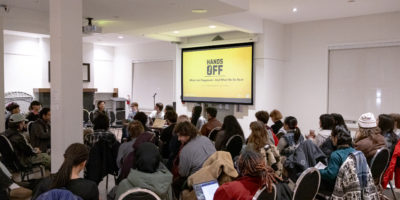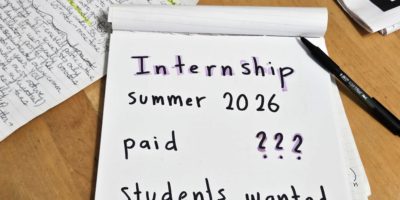By Nathaniel Crouch
Voting for the annual Ryerson Students’ Union (RSU) elections begins Feb. 13 and goes until Feb. 15. The Eyeopener asked the candidates running for executive positions about their plans, policies and politics.
Responses have been edited for length and clarity.
Vice-president education
The vice president education is responsible for policies and campaigns relating to the university itself as well as the city on behalf of students, which includes lobbying outside organizations for services. Salman Faruqi is running with Unify and Zena Salem with Elevate. The Rhino Party does not have a candidate for vice-president education.
The Eye: What should the RSU’s relationship with the Canadian Federation of Students (CFS) be?

Zena Salem, VP education candidate for Elevate.
Salem: I have not had many interactions with the federation. However, I sincerely believe that the students’ union’s relationship with the Canadian Federation of Students should be led by all of our members’ needs and priorities. As executives, we should be open to hearing from our members on their stance on membership in the federation. I am committed to supporting our members and ensuring that we are bringing forward the concerns our members have with the federation. I am aware that there are students that have questions about the purpose of the federation. If elected, I want to make sure that we are actively engaging students in the campaigns and services of the federation.
Faruqi: Regardless of personal opinions, my responsibility if elected vice-president education of the RSU is to make Ryerson students aware of the positives and negatives of their relationship with the CFS and represent their views. The CFS is essentially a student union for student unions. Ryerson students pay around $500,000 to the CFS each year. While the concept of the CFS is good, the CFS has failed to effectively execute many of its proposals. If elected vice-president education I will listen to my students, keep them informed and support them when they need it. Moreover, I will always place the needs of Ryerson students ahead of any external influencers.

Salman Faruqi, VP education candidate with Unify.
The Eye: How would you handle the U-Pass moving forward?
Faruqi: Daniel has effectively advocated for the implementation of the pass despite a lack of support from many of his fellow executives. Currently the U-Pass will be presented to the TTC board on March 20th in order for them to approve a price. After the price has been approved the RSU must present the initiative to the Board of Governors and run a referendum campaign. I intend to run the campaign in the fall semester of 2018 using my experiences as student action commissioner on the RSU [last year]. As student action commissioner I have actively worked on this initiative with Daniel. This includes helping with the creation and analysis of the U-Pass survey and participating in multiple events to help promote the U-Pass.
Salem: I will continue the work the current vice-president education has started. The U-Pass has been successful and it will benefit students a lot once it’s officially implemented. I will see how far [current vice-president education] Daniel Lis has gotten into the U-Pass, and continue the work from there to ensure we work towards its finalization. I want to make it accessible within the GTA, to make sure students who use the GO Transit and other forms of transit beyond the TTC have access to the U-Pass. As a commuter school, it’s so important students can access campus without breaking the bank. For that reason, I will continue by pushing for the U-Pass’ referendum through the [Board of Governors]. This past semester, I volunteered with the Feed Students Support Survivors referendum. I learned a lot about the process to campaign for a successful referendum with high voter turnout. If elected, continuing the work on the U-Pass and holding a referendum would be my priority.
The Eye: How would you like the RSU’s relationship with Ryerson administration to change?
Salem: I think that it is important for the students’ union to maintain a respectful relationship with the administration to be able to work effectively for our members. We have seen so many victories that have not required a hostile relationship with the administration, for example the introduction of the fall reading week. However, I know that there are going to be times where the priorities of our institution do not line up with the needs of our members. In these cases I’m committed to pushing the university to see our side of the issue.
Faruqi: The RSU and Ryerson administration both work for the betterment of Ryerson students. We’d like to work with the university to improve student experience on campus and Ryerson’s brand while placing student needs ahead of others.
The Eye: What are some specific plans or programs you’d like to implement during your term?
Faruqi: Textbooks are an additional burden added to students. One of the initiatives I’d like to introduce next year is Open Educational Resources (OERs). OERs are class materials (including textbooks and lecture notes) available online for free. I believe that the introduction of OERs will revolutionize the face of education in Ryerson. Aside from OERs, as vice-present education, I’d like to advocate for student input in the creation of Ryerson’s new Brampton campus. Ryerson is an innovator due to its students. Adding student voices to this initiative will enhance the quality of education offered by Ryerson. As well as this I’d like to continue the programs which the current vice-president education is running including the career development grant and the U-Pass. I’d like to pass the U-pass referendum in the fall semester of 2018 and include commuting as a category in the career development grant.
Salem: If elected, I would like to start working with the Senate and the Ryerson Faculty Association to potentially look into a system to get recorded lectures. We’re a commuter school, and having the options to view and review lectures online will make education overall much more accessible to Ryerson students. I will also work with faculty, the Chang school, and board members to look into courses with a higher failure rate, and from there work towards ensuring we prioritize needed spring and summer courses on top of upper and lower liberals.













Leave a Reply